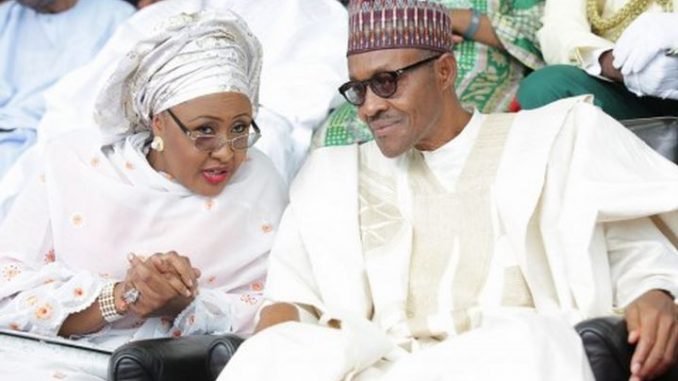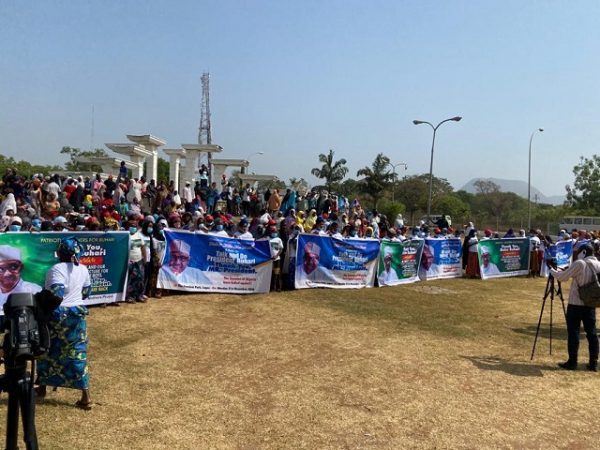- First Lady Aisha Buhari has revealed that her husband and President of Nigeria, Muhammadu Buhari suffered Post Traumatic Stress Disorder (PTSD) for many years.
- Aisha said her husband suffered PTSD for many years after his involvement in Nigeria’s civil war without rehabilitation, his overthrow as military head of state, and subsequent detention for 40 months without being charged with any offence.

First Lady Aisha Buhari has revealed that her husband and President of Nigeria, Muhammadu Buhari suffered Post Traumatic Stress Disorder (PTSD) for many years.
ThisDay and Arise TV reported that she said this at the ground-breaking ceremony for the Armed Forces Post Traumatic Stress Disorder Centre (AFPTSDC) initiated by the Mrs Lucky Irabor-led Defence and Police Officers’ Wives Association (DEPOWA).
Aisha said her husband suffered PTSD for many years after his involvement in Nigeria’s civil war without rehabilitation, his overthrow as military head of state, and subsequent detention for 40 months without being charged with any offence.
The First Lady added that Buhari’s loss of three consecutive elections further complicated the situation she was confronted with at 19, when she married him. She further revealed that she became an unintended physiotherapist who nursed him to recovery.
She said;
“I want to thank DEPOWA for this foresighted vision of establishing a Post Traumatic Stress Disorder (PTSD) Centre for our soldiers. Indeed, PTSD is a mental health condition triggered by terrifying events.
“It is a reality that soldiers and military families have to live with, despite its negative consequences. Being a soldier’s wife or a retired soldier’s wife and a wellness expert, I understand the challenges associated with PTSD and its impact on military families and the nation.
“My husband served the Nigerian Army for 27 years before he was overthrown in a coup d’état. He fought civil war for 30 months without rehabilitation; he ruled Nigeria for 20 months and was detained for 40 months without disclosing the nature of his offence.
“One year after he came out from detention, we were married, I clocked 19 years in his house as his wife, legitimately. I suffered the consequences of PTSD, because having gone through all these, and at the age of 19, to handle somebody, who was a former Head of State and Commander-in-Chief of Nigeria’s Armed Forces, to tell him that he is wrong is the first mistake you will make.
“So, at the age of 19, I had to figure out how to tell somebody of his calibre that he was wrong or right and that was the beginning of my offence in his house, and contesting elections in 2003 and failed, 2007, failed and 2011, the same thing – all without rehabilitation – I became a physiotherapist.
“Finally, the whole nation rose against the misuse of power and bad governance. He only succeeded when it became a movement and here we are today. He ruled Nigeria before and he is ruling Nigeria now and this is the last time and final.
“Failing election for three times was a big blow to every contestant but those that have contested for just yesterday, a simple primary election, they are still living in a traumatic condition, I tried to console them, I tried to talk to them, some of them have switched off their phones up till today, just because of a primary election.
“You can imagine myself at 19 years, handling somebody that went to war, suffered coup d’état, then lost several elections, and, finally, getting to the Villa in the 2015. Also, for a woman to tell them that this is wrong or right in Nigeria and Africa is a problem.”
Aisha Buhari also commended members of the armed forces for their contributions to nation. She added;
“In that case, I want to use this opportunity to appreciate members of the Armed Forces of Nigeria for their sacrifices and contributions to nation building.
“The fallen Heroes remain evergreen in our minds and many with us are wounded physically and mentally. I want to appreciate their wives and families; I want to let them know that the whole nation is with them.”
Aisha stated that the PTSD centre was important to members of the armed forces and beyond, stressing that soldiers are the primary victims.



